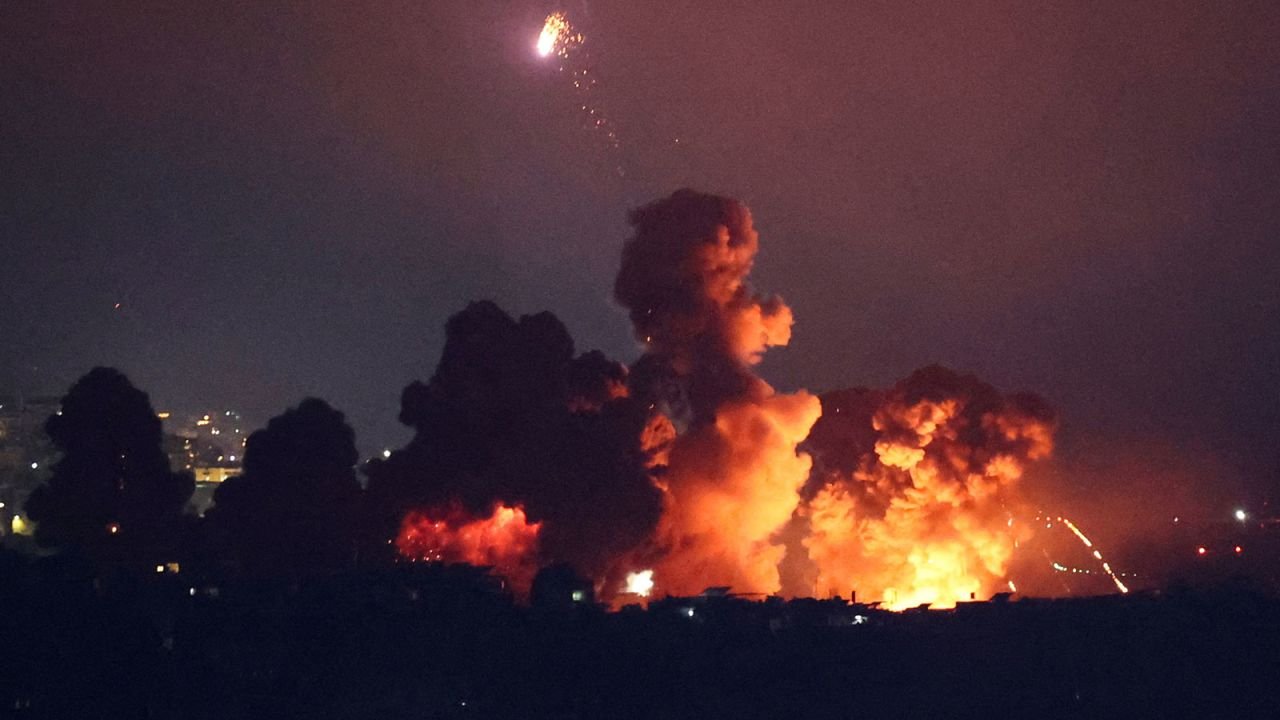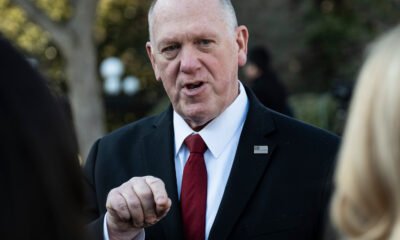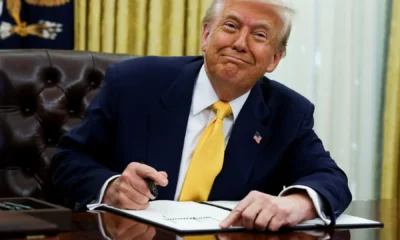United States
Donald Trump Strikes Back with Controversial Travel Ban Targeting 19 Countries
The US President reintroduces sweeping travel restrictions citing national security, terrorism, and immigration control, triggering global debate and domestic division.

In a dramatic political move that’s already dominating global headlines, Donald Trump has reinstated a broad travel ban, targeting a total of 19 countries with either full or partial entry restrictions. Calling it a “decisive act to protect the American people,” the US President declared the measure via a presidential proclamation, scheduled to go into effect on June 9. The move echoes the controversial immigration orders from his first term but goes even further — affecting more countries and more visa categories.
According to the White House, 12 countries face a total travel ban, meaning citizens from these nations will not be allowed to enter the United States under any visa category. These include: Afghanistan, Myanmar, Chad, Republic of the Congo, Equatorial Guinea, Eritrea, Haiti, Iran, Libya, Somalia, Sudan, and Yemen. Meanwhile, 7 other countries — Burundi, Cuba, Laos, Sierra Leone, Togo, Turkmenistan, and Venezuela — have been placed under partial bans, with specific visa types such as business, tourist, student, and immigrant visas facing sharp restrictions.
The US President, in a post on his social media platform Truth Social, justified the sweeping bans in light of recent security threats and alleged failures in foreign governments’ ability to cooperate with U.S. screening systems. “We cannot and will not take chances,” he declared. “If a country cannot prove who its people are, or if it harbors or sponsors terrorism, then we have every right — and duty — to stop them at our borders.”
The “Trump Travel Ban 2.0”, as it’s already being called by critics and supporters alike, was prompted in part by a recent violent attack in Colorado, reportedly carried out by a foreign national. While the incident remains under investigation, the administration used it to reinforce the perceived risks of inadequate vetting and foreign extremist threats.
Beyond terrorism links, the administration cited fragile governments, lack of civil infrastructure, and high visa overstay rates as the rationale behind the ban. Nations like Somalia, Sudan, Yemen, and Afghanistan were highlighted for having little to no capability to verify the identity of their citizens or share critical data with U.S. immigration authorities. Others, like Chad and Eritrea, were flagged for extremely high overstay violations — with over 50% of their nationals allegedly violating visa terms.
The move also reopens controversial chapters in recent American immigration history. During Trump’s initial presidency, the 2017 travel ban was widely criticized for targeting Muslim-majority nations and was eventually overturned by President Biden. Now, just five months into his second term, Trump’s immigration crackdown has not only returned but expanded, igniting fierce reactions from civil rights groups, legal scholars, and foreign governments.
Particularly contentious is the inclusion of Haiti and Afghanistan, both of which house large populations of refugees and U.S. allies. Advocates have warned that stripping protections from thousands of Afghan nationals who aided American troops during the two-decade war could be seen as betrayal. Similarly, the narrative surrounding Haitian migrants, often framed in xenophobic rhetoric, has raised alarm among human rights organizations.
However, supporters of the administration argue that national safety must take precedence over diplomatic or humanitarian concerns. White House Press Secretary Abigail Jackson defended the decision, stating: “President Trump will never apologize for putting the security of American families first. We must act proactively, not reactively.”
With implementation looming, the ban is expected to affect thousands of visa applicants, students, and immigrants currently in process — casting a cloud of uncertainty over global mobility and diplomatic relations. As legal challenges mount and protests rise, one thing is clear: Trump’s immigration policies are back, and they are bolder than ever.
World
Israel’s Explosive Strike on Iran Ignites Political Firestorm in Washington
As Israel targets Iran’s nuclear and military command centers, US lawmakers reveal deep divisions on foreign policy, war strategy, and blame

In a move that has sent shockwaves through global corridors of power, Israel has launched a high-intensity strike on Iran’s nuclear facilities and senior military infrastructure, triggering urgent discussions across the U.S. political spectrum. With the Middle East now teetering on the brink of a broader regional conflict, American lawmakers are responding with a mixture of fiery support, stern caution, and harsh criticism.
The military operation, widely interpreted as a preemptive strike to thwart Iran’s nuclear ambitions, has been both lauded and condemned by prominent voices in Washington. Senate Majority Leader John Thune aligned firmly with Israel, declaring that the Senate “stands ready” to support the President and Israeli allies in restoring peace, while warning Tehran of the grave consequences should they retaliate against American forces.
House Speaker Mike Johnson, echoing a similar sentiment, reaffirmed Israel’s right to self-defense, stating plainly: “Israel IS right—and has a right—to defend itself!” Meanwhile, House Democratic Leader Hakeem Jeffries emphasized bipartisan concern over Iran’s nuclear capabilities, labeling the Islamic Republic “an enemy to the free world.”
However, unity quickly gave way to political friction. Senator Jeff Merkley of Oregon criticized Israel’s actions, blaming the collapse of the 2015 Iran nuclear deal—withdrawn under the Trump administration—for current tensions. Merkley insisted that Iran’s program would still be under tight international monitoring had the deal remained intact.
In sharp contrast, Senator Tom Cotton, chair of the Senate Intelligence Committee, issued an ominous warning: “Iran is rushing to build not only nuclear weapons but also missiles that can strike the United States… we back Israel to the hilt, all the way.” Cotton’s statement underscores the hawkish perspective that views military intervention as a necessary deterrent against a nuclear-armed Iran.
Others offered more measured responses. Senator Tammy Duckworth, a veteran and Armed Services Committee member, called for “close monitoring” and “de-escalation,” highlighting the human toll such conflicts often exact. Similarly, Representative Adam Smith of Washington urged both Iran and Israel to act with caution, emphasizing that “too many innocent civilians are at risk.”
More pointed blame came from Senator Chris Murphy, who directly faulted former President Donald Trump and Israeli Prime Minister Benjamin Netanyahu. Calling the current standoff “a disaster of their own making,” Murphy warned of a “new, deadly conflict” erupting in the region.
Senator Jack Reed, the ranking Democrat on the Senate Armed Services Committee, didn’t mince words, labeling the Israeli strike a “reckless escalation.” Reed’s concern echoes fears shared by global allies—that the situation could destabilize the already volatile region and potentially draw the U.S. into another extended military engagement.
As tensions boil, one thing remains clear: the U.S. is deeply divided not just on how to respond to Israel’s dramatic military maneuver, but on who should bear the burden of blame for the escalating crisis. While hawks call for unwavering support and retribution, doves warn of another endless war spiraling out of control.
With Iran expected to retaliate in some form, and the Biden administration walking a diplomatic tightrope, the world watches with bated breath. The next 48 hours could redefine the power dynamics of the Middle East—and America’s role in it.
United States
Country Singer Conner Smith Involved in Fatal Car Accident That Leaves 77 Year Old Woman Dead
The 24-year-old Nashville star is cooperating with authorities after striking a pedestrian in a marked crosswalk, police confirm no signs of impairment

Country music’s rising star Conner Smith is at the center of a heartbreaking tragedy following a fatal car accident in Nashville, Tennessee. According to local authorities, the 24-year-old singer was behind the wheel of a Chevrolet Silverado when he allegedly struck Dorothy Dobbins, a 77-year-old woman, who was walking across a marked crosswalk on June 8, 2025, in the Germantown neighborhood.
The incident occurred around 7:30 p.m., just as Dobbins was returning from a nearby dog park. Police say Smith was traveling north on Third Avenue North when he hit the elderly woman at the intersection of Van Buren Street. Dobbins, who lived in the area, was rushed to Vanderbilt University Medical Center, where she later died from her injuries.
A preliminary investigation by the Metropolitan Nashville Police Department stated that the primary contributing factor in the crash was Smith’s failure to yield the right of way to the pedestrian. However, officers confirmed Smith showed no signs of impairment at the scene. Authorities also emphasized that there are no charges filed at present, and the investigation remains ongoing.
Smith’s legal team released a public statement shortly after the accident, calling the incident a devastating accident and confirming the singer’s full cooperation with the investigation. “His heart goes out to Ms. Dobbins’ family during this incredibly difficult time,” the statement read.
A source close to Smith clarified that the singer was neither distracted by his phone nor under the influence, and that the accident was not the result of reckless behavior. Still, the emotional toll on both families is palpable, with fans and fellow artists expressing condolences online.
The tragedy occurred on the final day of CMA Fest, a four-day country music celebration in Nashville, where Smith is a well-known local figure. Signed to Big Machine Records’ Valory label, Smith has toured with Luke Bryan, was nominated for New Male Artist of the Year at the 2024 ACM Awards, and recently contributed to the Twisters movie soundtrack. In April 2024, he also celebrated his marriage to surfer Leah Thompson.
While the music world reels from the news, many await the final outcome of the investigation. For now, the spotlight is not on Conner Smith’s career milestones—but on a tragedy that has shaken a neighborhood and taken a life.
Business & Finance
Chicago White Sox Set for Ownership Shift as Justin Ishbia Poised to Take the Helm
Billionaire investor Justin Ishbia enters long-term agreement to potentially acquire controlling interest from Jerry Reinsdorf by 2034

In a significant development for Major League Baseball, Chicago White Sox chairman Jerry Reinsdorf has laid the groundwork for a future ownership transition by entering into a long-term investment agreement with billionaire private equity investor Justin Ishbia. The deal, announced on June 5, 2025, positions Ishbia to potentially assume controlling interest in the franchise between 2029 and 2034.
Under the terms of the agreement, Ishbia will inject capital into the White Sox as a limited partner in 2025 and 2026, aiding in debt reduction and supporting ongoing operations. Reinsdorf, who has owned the team since 1981, retains control but has the option to sell the franchise’s controlling interest to Ishbia between 2029 and 2033. If a deal isn’t completed by then, Ishbia will have the option to take over after the 2034 season.
Reinsdorf, 89, expressed his sentiments in a statement: “Having the incredible opportunity to own the Chicago White Sox and be part of Major League Baseball for nearly 50 years has been a life-changing experience. I have always expressed my intent to operate the White Sox as long as I am able and remain committed to returning this franchise to the level of on-field success we all expect and desire.”
The potential change in ownership comes at a time when the White Sox are seeking a resurgence. The team set a modern-day MLB record for losses last season, finishing with a 41-121 record, and is currently off to another challenging start. Fans have been vocal about their desire for new leadership to revitalize the franchise.
Ishbia, 47, is the founder of Chicago-based Shore Capital Partners and holds a significant stake in United Wholesale Mortgage. He is also a part-majority owner of the NBA’s Phoenix Suns and WNBA’s Phoenix Mercury, along with his brother Mat Ishbia. Additionally, he holds a minority stake in MLS club Nashville SC.
While the agreement outlines a clear path for Ishbia to eventually take over the White Sox, it does not guarantee that the transaction will occur. Reinsdorf remains the sole decision-maker for the foreseeable future, and the team emphasized that there is no assurance any such future deal will happen or that an ownership change will occur before 2029.
The White Sox are also exploring avenues to build a new ballpark, with Reinsdorf lobbying for a new stadium in Chicago’s South Loop. However, these plans may face challenges, especially after the Chicago Fire FC announced intentions to build in the same area.
As the franchise navigates these developments, the agreement between Reinsdorf and Ishbia represents a potential turning point for the White Sox, offering hope for a revitalized future under new leadership.
-

 Entertainment6 days ago
Entertainment6 days agoHe-Man Wears a Suit Now… Nicholas Galitzine’s ‘Masters of the Universe’ Trailer Drops a Shock Fans Didn’t See Coming
-

 Entertainment1 week ago
Entertainment1 week agoBrazil Eyes Oscar History Again… ‘The Secret Agent’ Scores Best Picture Nomination as Wagner Moura Stuns Hollywood
-

 Entertainment4 days ago
Entertainment4 days ago“Comedy Needs Courage Again…”: Judd Apatow Opens Up on Mel Brooks, Talking to Rob Reiner, and Why Studio Laughs Have Vanished
-

 Entertainment1 week ago
Entertainment1 week agoBox Office Shocker as Chris Pratt’s ‘Mercy’ Knocks ‘Avatar 3’ Off the Top but Nature Had Other Plans…
-

 Entertainment6 days ago
Entertainment6 days agoOscars Go Global in a Big Way as This Year’s Nominations Signal a New Era: ‘The Academy Is Finally Looking Beyond Hollywood…’
-

 Entertainment1 week ago
Entertainment1 week agoMichael Bay Makes a Power Move… Blockbuster Director Signs with CAA in a Deal That’s Turning Heads
-

 Entertainment6 days ago
Entertainment6 days ago“Dangerously Kinky… and Darkly Funny”: Olivia Wilde and Cooper Hoffman Push Boundaries in ‘I Want Your Sex’
-

 Entertainment1 week ago
Entertainment1 week agoFans Didn’t Expect This Look… Nicholas Galitzine’s Masters of the Universe Trailer Sparks Debate






















Pingback: Mark Zuckerberg Rises as Musk's Fortune Plummets Amid Trump Feud - Daily Global Diary
Pingback: Trump Mobile Plan and Gold Smartphone Spark Buzz and Big Questions - Daily Global Diary
Pingback: Jay Jones Secures Democratic Nod for Virginia Attorney General Setting Up High Stakes Clash - Daily Global Diary
Pingback: Trump slams ‘too many non-working holidays’ on Juneteenth — says it’s costing America ‘$BILLIONS’ - Daily Global Diary